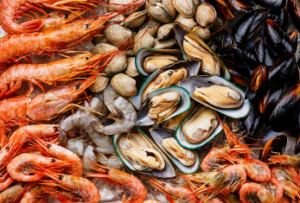Many people prefer fresh seafood over frozen, but there’s nothing wrong with choosing the latter.
 Frozen seafood can last for up to a year if stored properly. Store it in a freezer at the right temperature or in a tightly sealed container that excludes air and moisture.
Frozen seafood can last for up to a year if stored properly. Store it in a freezer at the right temperature or in a tightly sealed container that excludes air and moisture.
Freshness
From the impressive red side of slow-roasted wild sockeye salmon served as a holiday centrepiece to the crowd-pleasing shrimp tossed into a skillet for a quick and easy dinner, frozen seafood offers a variety of culinary possibilities. Yet, for many consumers, seafood is considered a luxury and is only bought with specific meals in mind.
Grocery shoppers often choose fresh over frozen seafood, assuming it is healthier. However, this notion is flawed because it ignores that freshness is not synonymous with nutritional value. Freezing seafood, when done correctly, can maintain the quality and flavour of fish. Frozen seafood has a similar nutritional profile to fresh fish and, in some cases, can even have higher levels of nutrients, such as omega-3 fatty acids.
When properly frozen, a seafood product retains its texture and taste for months. It can significantly benefit those who cannot afford to purchase or store fresh seafood for long periods.
Moreover, frozen seafood can help reduce food waste and the environmental impact of wasted food. Many people throw away seafood because they forget to thaw it in time or do not cook it as quickly as intended. During a supermarket intervention that included recipes and four weekly taste sessions in a Philadelphia, PA, supermarket, O’Donnell and her colleagues found that when consumers were told they could cook seafood “direct from frozen” without defrosting it, they consumed more.
Furthermore, frozen seafood can appeal to a broader consumer base by offering a more comprehensive range of seafood options than fresh fish, including breaded/battered and complete dinners. By reducing the need for a constant supply of fresh seafood, frozen foods can also make it easier for restaurants and cafeterias to plan menus.
Variety
Frozen seafood is available in a wide variety of options. Some are simple and wholesome, like ‘naked’ seafood, which is snap-frozen with nothing added. Others may be seasoned with salt or smoked, so check the label. Generally, frozen fish and seafood are flash-frozen at low temperatures to prevent ice crystals from forming. It helps preserve the integrity of the flesh and increases texture and flavour.
It differs from canned fish, mainly used for convenience and to fill gaps in the market when fresh supplies are limited or unavailable. Frozen fish and seafood products have a longer shelf life than new ones and can be stored for as long as three months.
The popularity of frozen seafood is growing as more consumers embrace the idea that they don’t have to give up on high-quality protein in their diet. The good news is that frozen seafood can be just as healthy as fresh, and it can provide an excellent option for those who want to enjoy the taste and convenience of fish but don’t have much time for cooking.
Despite the benefits of frozen seafood, many consumers still believe it is inferior to fresh. Common perceptions include the notion that frozen seafood is lower in quality, is not as healthy, and is more expensive. These beliefs are often based on the perception that fresh foods are more healthful and natural and on misconceptions about how foods are frozen and prepared.
However, this attitude is fading. Several supermarkets have found success in promoting their frozen seafood, and most participants in a focus group were open to cooking with frozen fish or seafood when provided with recipes that could be made directly from the freezer. It suggests that the challenge is convincing consumers to set aside their preconceived ideas and reach for options in the freezer case that combine taste, convenience, and sustainability.
Convenience
Frozen seafood is less sensitive to seasonality, which allows it to be available year-round. It is a significant benefit for restaurants and canteens as it helps with menu planning and will enable them to control costs. The frozen food industry is also using new and innovative methods of freezing, which have been proven to improve the health of the fish and maintain the integrity of its texture, colour, and flavour.


